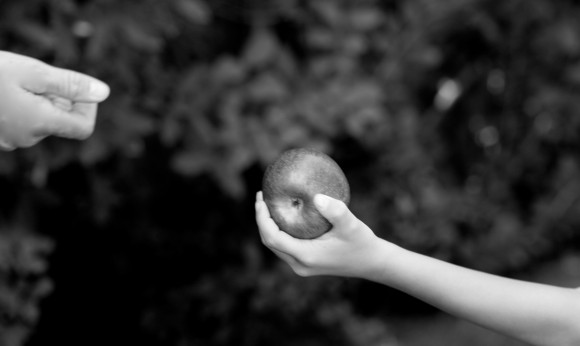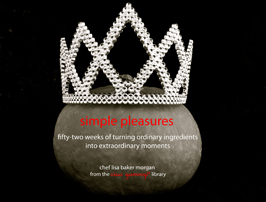
Mother’s Day 2015
Forgiveness & (So-called) Mistakes
&
Tarte Tatin
Each year in honor of Mother’s Day I write a personal recipe for life inspired by and for my daughters accompanied by a food recipe relevant to the message. This year it is about forgiveness and so-called mistakes. The correlating recipe is the infamous French Tarte Tatin. If you would like to skip directly to the tarte Tatin recipe you may do so by clicking here. The fact that this post is technically posted after-Mother’s Day, well, forgive me.
warmly,
LM

The thirteen heirloom apple trees we planted in the front yard of our Los Angeles home produce fruit twice a year. With Spring came the trees’ first blossoms. I promised you that April’s rain would bring May’s tarte Tatin. Right on que, the branches are dripping with fruit, and I am in the kitchen.

As I core the apples for that promised tarte Tatin, I reflect on the origin of the dessert, the concept of mistakes, and the related concept of forgiveness. Much like the apple I hold in my hand, forgiveness is a key ingredient for life.
One of the truths in life, as you are beginning to realize, is this: even those you love the most, those you depend on, and those whom you may admire, have done things or will do things that disappoint you, hurt you (or those you love), betray you, and/or let you down. People you do not know personally are similarly capable of hurting you or those you love. Sometimes your hurt will be profound.
The reason for this most certain disappointment and hurt is simple: people are imperfect and life is made up of relationships between imperfect people. Relationships with your parents, your friends, your siblings, your business colleagues, your schoolmates, and in the future (I said, FUTURE), romantic relationships. In its largest sense, we all are in a relationship with one another as part of society.
Most politely said, imperfect people mess up. They mess up objectively. They mess up in your opinion. You will mess up. Sometimes we feel the need to know why because we think that if we understand the person’s motivation then we can get a grasp on our own or hurt or prevent a similar situation in the future. But gaining any explanation or understanding of “why” does not undo what has been done. It will not take away the pain. If it was you who committed the offense, your guilt will continue.
Forgiveness is the ingredient.

As we age, forgiveness becomes harder. When you are small and you hurt your friend’s feelings, you said you were sorry and they forgave you. It was easy then. But the older we get, the subject matter and the offenses are greater (although, sadly, for some children, this is not the case), and we become burdened with things like pride and ego. Entrenched in a position of who is “right,” who is “wrong,” and whether someone deserves forgiveness, forgiveness is stubbornly difficult. Elton John had a beautiful song, it pre-dates you by a few years, but in the song he says that “sorry seems to be the hardest word.” I believe there is truth to that.
Forgiveness has three components: asking for forgiveness; forgiving others; and forgiving yourself. As your mother, with only my experience and additional years to act as any expertise, I offer my thoughts on all three circumstances.

Asking for Forgiveness: Saying You Are Sorry
You know when you messed up. It is not complicated. Your family and church have taught you enough that you intrinsically know when you did something, said something, or failed to do something, that you should or should not have done. You acted wrongly. An apology is in order. Asking for another person’s forgiveness is an acknowledgment of what you did that caused the injury and you are sincerely sorry. Without both, the apology is pointless.
Apologies acknowledge your role in the situation. Those that focus on the behavior or interpretation of the other person, such as, “I am sorry you took it that way” or “I am sorry you ….” are manipulative word-trickery, in my opinion. Own up to what you did. Even if the result was not what you intended, you can say, “I am sorry that I hurt you, it was not my intent” or whatever the case may be.
Be sincere. If you are apologizing just to put an end to the conversation or go through the motions, that is not an apology. You will not become conscious of your own behavior and are likely to repeat the behavior. Nothing will be resolved.
You have asked me why as Catholics we confess our sins to a priest. It is a common question. Confession (contrition) is about us acknowledging what we did by saying it out loud, and being sincere in our request for forgiveness. It is not about the priest. Forgiveness comes from God and only God knows if we are sincere.
Once you apologize, that is it. The matter should be over. You need not continue to apologize. You have done your part.
Apologizes in a Business Relationship
I will only briefly mention this because I believe it warrants mentioning. When I practiced law, I often saw a gender discrepancy when it came to apologies. Females had a tendency to apologize for everything, even things that were not their fault. Men, on the other hand, rarely apologized. It was an interesting dynamic. I think that somewhere in the middle is best and would suggest this:
If you had a part in something that went awry, acknowledge the situation, apologize for the error, and have a solution. It is business, not personal, and stuff happens. No one wants to work with or rely on someone who scampers around issuing apologizes for everything, nor with those that only point out the existence of problems. Instead, be the person to say, “Yes, this happened [insert a truthful and brief explanation here] but this is what we can do to fix it.” Focus on wiping up the spilt milk, not the fact it was split.
Enough said. Let’s move on.
Forgiving Others
People in your life may hurt you in ways that may be objectively unimaginable. You may think that the person does not “deserve forgiveness” or “if they are seeking absolution, they are not getting it from me.” But, if you do not forgive others the pain or hurt that you feel will fester, the resentment will eat away at you, and it will chain you to the past. If you do not let go of it in a healthy way, you will drag it with you like a shackle. It will affect your perspective, your relationships, and your health. It will age you and make you bitter.
“Forgive” is defined, in part, in the Merriam-Webster dictionary as:
(1) to stop feeling anger toward (someone who has done something wrong): to stop blaming (someone)
(2) to stop feeling anger about (something) : to forgive someone for (something wrong)
Notice that forgiveness is not about the person who committed the offense. It is about you ceasing to be angry or assessing blame. But, how can we do this? Sometimes we do not want to let the person off the hook. Sometimes we want the person held accountable.
About nine years ago, I was volunteering for something at church. As I made my way to the correct conference room, I passed through a room where a man was speaking to a group. I did not know him nor have I seen him since. I stopped as I passed the door because he said something to the group that resonated with me. The gift of this inadvertent passing, I pass on to you.
He said:
“Forgiving another person is not condoning their behavior”
Read it again. Forgiveness is not condoning the behavior. Forgiving a person does not say their behavior was right or justified or insignificant. Rather, forgiveness releases you. It is saying that you may not approve of what the person did, but you are letting it go of it because you are not going to be bound by their behavior. By ceasing the blame, ceasing to be angry, it lets you leave the past in the past. It allows you to put the matter in perspective, embrace it, move on, and hopefully, learn from it. Forgive. Forgive others even when the other person does not ask for your forgiveness because often they will never ask. Often you may never get an acknowledgement of wrongdoing or a validation of your pain, and that is okay. Forgive them all the same.
Two things go hand-in-hand when you forgive someone. First, once you forgive someone, stop punishing them, and cease reminding them of the offense. Second, forgiveness does not mean becoming a doormat. Your grandfather oft repeated a saying I will pass on to you:
“Burn me once, shame on you. Burn me twice, shame on me.”
There will be people that you forgive, and they will continue to let you down. Repeat offenders, I call them. Repeat offenders are not in your best interest. Forgive them and move on from the relationship or situation.
Forgiving Yourself and The So-Called Mistake
Equally important is learning to forgive yourself. There will be times that you will not perform as you want. You will say things that you could have said better. You will do things that you wished you did not do. If need to make amends, do. Learn from the situation, and move on.
The concept of mistakes often goes hand-in-hand with forgiveness. I have told you that I do not believe in mistakes. I still don’t. Something can be learned from everything. Things commonly are referred to as “mistakes” or “accidents,” I think of as the unintended: You took a road you did not intend to travel on; your project or experiment did not yield the results you anticipated; the relationship did not turn out as you wanted. All of these things have value in and of themselves. Think of the time we were on our way to Portofino and we ended up in Genova? That unintended turn resulted in fun stories, new territory and a recipe that you enjoyed for years. Think of all of the recipes I set out to make and I discover in the process something else that works better. Was the original recipe a mistake? Not at all. It was a starting point; a stepping stone; a matter of deduction. No mistake.
I am not the only cook who has discovered the joys of the unintended result in the kitchen.
Here is where I make a recipe reference.

Sisters Stephanie and Caroline Tatin worked at the Hotel Tatin in Lamotte-Beuron, in the Loire Valley of France. Stephanie started to make an apple dessert but left it cooking too long. In a hurry, she put the crust on top of the apples and finished the dessert in the oven. The unintended apple dessert became known as the tarte des demoiselles Tatin (tart of the unmarried sisters) and made history. It would also become one of your favorite desserts: the Tarte Tatin.
Much like forgiveness, the technique for creating the tart is composed of three essential steps: (1) cook the apples, (2) cover them with a crust, and (3) caramelize them in the oven.
And, similar to forgiveness, the Tatin technique can be used in a variety of situations for the rest of your lives.
Life is delicious. Remember that.
Mom

Past Mother’s Day posts:
- Rising to the Occasion (recipe classic chocolate soufflé) 2014
- Speak Carefully and Carry a Positive Message (recipe: cherry granita) 2013
- Having the Courage to Follow Your Heart (recipe: crunchy chocolate and espresso almond cookies) 2012
- Women Eat Pasta, Crêpes, and Bread (recipe: classic tomato sauce) 2011
Tags: apples, dessert, mother's day, Tart, tarte tartin







Leave a Reply